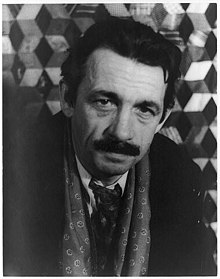Thomas Hart Benton (painter)
| Thomas Hart Benton | |
|---|---|

Benton in 1935
|
|
| Born |
April 15, 1889 Neosho, Missouri |
| Died | January 19, 1975 (aged 85) Kansas City, Missouri |
| Nationality | American |
| Known for | Painting |
| Notable work | "America Today" (1930-31), "Indiana Murals" (1933), "Social History of Missouri" (1936), "Persephone" (1938-39) |
| Movement | Regionalism, Social Realism, American modernism, American realism, Synchromism |
Thomas Hart Benton (April 15, 1889 – January 19, 1975) was an American painter and muralist. Along with Grant Wood and John Steuart Curry, he was at the forefront of the Regionalist art movement. His fluid, sculpted figures in his paintings showed everyday people in scenes of life in the United States. Though his work is strongly associated with the Midwestern United States, he studied in Paris, lived in New York City for more than 20 years and painted scores of works there, summered for 50 years on Martha's Vineyard off the New England coast, and also painted scenes of the American South and West.
Benton was born in Neosho, Missouri, into an influential family of politicians. He had two younger sisters, Mary and Mildred, and a younger brother, Nathaniel. His mother was Elizabeth Wise Benton and his father, Colonel Maecenas Benton, was a lawyer and four times elected as U.S. congressman. Known as the "little giant of the Ozarks", Maecenas named his son after his own great-uncle,Thomas Hart Benton, one of the first two United States Senators elected from Missouri. Given his father's political career, Benton spent his childhood shuttling between Washington, D.C. and Missouri. His father sent him to Western Military Academy in 1905-06, hoping to shape him for a political career. Growing up in two different cultures, Benton rebelled against his father's plans. He wanted to develop his interest in art, which his mother supported. As a teenager, he worked as a cartoonist for the Joplin American newspaper, in Joplin, Missouri.
...
Wikipedia
